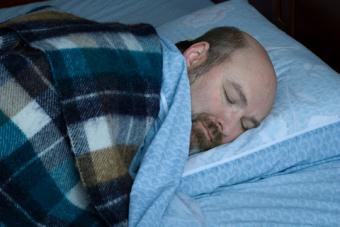
Idiopathic hypersomnia is a rare but serious sleep disorder that has no cure. Individuals with this unusual condition experience daytime sleepiness that is debilitating. Though there is no cure for the condition, patients may find relief using lifestyle changes and medication. In some cases, the symptoms of the sleep disorder spontaneously improve.
What Is Idiopathic Hypersomnia?
Hypersomnia is excessive fatigue even though the person had a full night of sleep. When a person has hypersomnia they may, over time, experience significant problems including memory loss, anxiety and low energy.
Typically, hypersomnia has some underlying cause that needs to be addressed. Once the underlying condition is treated, the patient may find relief. Conditions which may lead to excessive daytime sleepiness include:
- Sleep apnea
- Depression
- Head injuries
- Viruses
- Fibromyalgia
- Epilepsy
- Restless leg syndrome
- Hyperthyroidism
An idiopathic condition is one that has no known cause. Not having a cause can lead to problems because the cause of a medical condition is usually what helps doctors to develop treatment plans. Idiopathic hypersomnia is excessive daytime sleepiness that has no known cause.
Symptoms
The National Institutes of Health lists the symptoms of this sleep disorder. Signs of idiopathic hypersomnia include:
- Unrefreshed after napping
- Difficulty waking
- Confusion or disorientation after waking
- Need for sleep during daytime activities
- May sleep up to 18 hours
Additional symptoms are:
- Anxiety
- Irritability
- Loss of energy
- Slowed speech
- Memory problems
- Poor appetite
- Restlessness
- Slowed thinking processes
A person may experience idiopathic hypersomnia with or without long sleep time. Patents may sleep more than 10 hours per night followed by excessive sleepiness during the day or they may sleep fewer than 10 hours and experience daytime sleepiness.
Hypersomnia and Narcolepsy
Hypersomnia may seem very similar to narcolepsy because the affected person has an overwhelming urge to sleep without any apparent reason. However, people with idiopathic hypersomnia do not experience sudden loss of muscle and they do not involuntarily fall asleep.
Proper diagnosis of the condition is the key to getting proper treatment and ruling out other disorders is an important part of the process.
Diagnosing Idiopathic Hypersomnia
The Mayo Clinic explains the process used to diagnose idiopathic hypersomnia. Evaluating a patient's daytime sleepiness using a test like the Epworth sleepiness questionnaire can establish the severity of the problem as well as its influence on the individual's daily life.
A patient may track sleep behavior using a sleep diary to track possible problems. Home testing may also include wearing a wristwatch-like device that tracks the sleeping and waking cycle in actigraphy.
One of the most effective tests used to detect sleep disorders is a polysomnogram. The sleep study can quickly rule out or detect sleep related disorders that may lead to excessive daytime sleepiness.
A multiple sleep latency test takes the sleep study one step further by measuring napping behavior. The test measures:
- How long it takes to fall asleep
- How long it takes to go into rapid eye movement (REM cycle)
The multiple sleep latency test can rule out narcolepsy. Patients with idiopathic hypersomnia fall asleep quickly but they do not automatically fall into the REM stage as frequently as individuals with narcolepsy do, according to the National Institutes of Health.
Other Factors
The doctor conducting the study should be aware of any medications the patient is taking since some prescriptions can interfere with the polysomnogram. Patients taking certain medications may have to stop before participating in the sleep study.
Other tests may be necessary to rule out medical conditions which lead to excessive sleepiness. A patient may undergo a psychological evaluation to rule out depression as a cause for the fatigue.
The American Sleep Association notes that a person needs to experience the symptoms uninterrupted for at least three months without an apparent cause.
Hypersomnia Treatment Options
The condition can be difficult to treat because it may be a symptom of an underlying medical problem. According to the National Institute of Neurological Disorders and Stroke, treatment for the sleep disorder is "symptomatic in nature." Approaches include using stimulants or other medication to counteract the excessive daytime sleepiness.
| Medication | Uses | Brand Names |
| Amphetamine | Chronic fatigue syndrome, narcolepsy | Vyvanse, Dexedrine, Adderall |
| Bromocriptine | Type 2 diabetes, Parkinson's disease | Cycloset, Parlodel |
| Clonidine | ADHD, high blood pressure, migraines | Catapres |
| Levodopa (L-dopa) | Parkinson's disease | Dopar, Bendopa, Eldopar, Levopa |
| Methylphenidate | Narcolepsy, ADHD, Pervasive developmental disorders | Concerta, Ritalin |
| Modafinil | Narcolepsy, shift work sleep disorder | Alertec, Provigil, Modavigil, Carim |
Focusing on alleviating the symptoms without addressing the cause of the problem may not lead to full recovery and it is important to discuss the sleep disorder with a physician who can determine if the fatigue is caused by a medical condition.
In some cases, a doctor may prescribe antidepressants or monoamine oxidase inhibitors (MAOI), depending on the patient's specific needs. Some of the medications used as a hypersomnia treatment for the daytime sleepiness are associated with other sleep disorders. For example, modafinil may be used to treat daytime sleepiness associated with obstructive sleep apnea.
Prognosis
Little is known about the prognosis for patients with idiopathic hypersomnia because the condition is so rare. As researchers learn more about the mysterious sleep disorder, more information about the prognosis should become available.
The encouraging news is the the condition may spontaneously disappear. A study from the Respiratory Support and Sleep Centre in Cambridge, United Kingdom found that people with idiopathic hypersomnia respond favorably to treatment, and in some cases, the condition improves without treatment.







